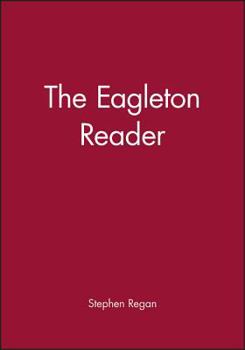Eagleton Reader
Select Format
Select Condition 
Book Overview
In The Eagleton Reader, Stephen Regan presents a lively and judicious selection of Terry Eagleton's essays, lectures and reviews, demonstrating the breadth and incisiveness of Eagleton's critical judgements, his playful, ironic intelligence, and his provocative intervention in the cultural debates of the past thirty years. This Reader is a valuable introduction to Eagleton's stimulating and entertaining work on modernism and postmodernism, nationalism and colonialism, aesthetics and ideology, cultural politics and sexual politics. Eagleton's brilliance as a literary critic is evident in essays on William Shakespeare, Thomas Hardy, W. B. Yeats, Oscar Wilde and Milan Kundera, while his more ruminative theoretical and philosophical writings are amply demonstrated in essays on Raymond Williams, Walter Benjamin, Arthur Schopenhauer and Ludwig Wittgenstein. The Reader includes a prefatory survey of its subject's career, extensive introductions to each of the six sections of essays, and a comprehensive bibliography of writings by and about Terry Eagleton.
Format:Paperback
Language:English
ISBN:0631202498
ISBN13:9780631202493
Release Date:February 1998
Publisher:Wiley-Blackwell
Length:464 Pages
Weight:0.40 lbs.
Dimensions:1.0" x 5.9" x 9.0"
Customer Reviews
1 rating
The direct wayward path.
Published by Thriftbooks.com User , 21 years ago
Terry Eagleton's own career path has followed a similair dialectical trend to his Marxist espousal of history. Not seen as a particularly original thinker within the realms of cultural theory, he nevertheless has done more to popularize its existance through the almost mandatory assigning of his book 'Literary Theory' to every B.A. English course in Britain. Alienated within the cultural stagnation of Oxbridge for over 30 years, he gladly packed up his belongings and moved across the Irish Sea without a morsel of regret. His current position as Professor of Cultural Theory at the University of Manchester gives some indication of his own (and indeed academia's) shift from English Literature to theoretical discourse.'The Eagleton Reader', edited by Stephen Regan was published in 1996 and so unfortunately doesn't cover Eagleton's more recent work in which he blurs the distinction between academic theorist and creative critic - I'm thinking of such books as 'The Truth About The Irish' and 'Figures of Dissent'-. 'The Eagleton Reader' gives a broad view of Eagleton's work from Catholic leftist of the 60's to postmodern debunker of the 90's. In terms of his own engaging style however, Terry really doesn't hit his stride until the 1980's. Most of the work featured here before that decade reads like the dry doctoral thesis of an industrious and serious-minded postgrad with a mundane enthusiasm for prefunctory Marxist criticism. Since 'Literary Theory' though, Eagleton has made a name for himself in relating cultural theories to everyday social and political practice and it is in this arena where he truely shines.In 'Estrangement and Irony in the Fiction of Milan Kundera', he points out the paralysis of communist Eastern Europe, where paranoia about state survelliance reigns. In this claustraphobic enivironment every signifier holds within it the potential for a multiplicity of signifieds. This overreading of signs leads to impotent paranoia. Coincedentaly, this absence of stable meaning is one of Eagleton's main criticisms of much postmodern theory. In the chapter on 'Ideology' he further lambastes the postmodern theorists for their political vaucity. A vacuousness that 'reflects their customary distance from the world in which most people have to live, mistaking the media and the shopping mall for the rest of social reality'. His own Marxist beliefs see him trying to hold on to those Enlightenment values which challeneged ancient fantasies by pointing those values towards the new fantasies of the media and consumerism. This illuminating chapter also covers the enduring contrast between the British academic world which Eagleton inhabited and the continental thinkers whom he drew most inspiration from. The 18th century Enlightenment saw the beginnings of this battle between the pragmatist and the ideologist. The French Revolution brought with it the cries for a society ruled by reason. But within the social upheaval that brought the Revolution about, much






